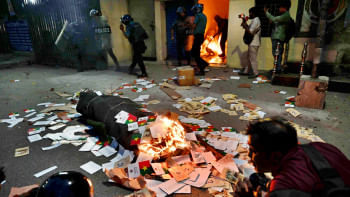18 killed in Yemen mosque blast
Eighteen people, mostly soldiers, were killed in Yemen yesterday when a blast blamed by authorities on Shia insurgents exploded at the entrance to a mosque in the rebels' stronghold.
A booby-trapped motorcycle exploded as hundreds of Muslim faithful were leaving the Bin Salman mosque in the northwestern town of Saada after Friday prayers, according to military sources at the site.
Forty-five people were wounded.
The attack on the mosque, located near an army barracks, raised fears of an escalation in violence between the government and Shia rebels whose insurgency in the mountainous province of Saada has claimed thousands of lives since 2004.
There was no immediate claim of responsibility, but a local official told AFP the attack bears the hallmarks of the "Huthis," as the rebels are known.
"Terrorist criminal followers of the terrorist Abdul Malak al-Huthi are behind this ugly crime," an interior ministry official told the Saba state news agency, referring to the rebels' field commander.
Military sources said the dead were mostly soldiers, but they also included women and child beggars who had been waiting for worshippers outside the mosque. Most of the injured were soldiers.
Ambulances rushed to the scene of the attack, which some witnesses said may have targeted the mosque's imam, or prayer leader, Askar Zuail. An army officer who adheres to the rigorous Salafi school of Sunni Islam, Zuail has used his sermons to mobilise worshippers against the Shia rebels.
Witnesses said the cleric had just left the mosque and was not hurt.
Local sources said the imam is an aide to Ali Mohsen, military commander of the northwestern region who has led the battle against the insurgents.
Mosques in Yemen cater for both the majority Sunni community and the Zaidis, a Shia offshoot, but are usually identified by the sect of their prayer leader. The rebels are Zaidis.
On Tuesday, seven soldiers were killed and 20 wounded when their convoy was ambushed by rebels in Saada.
The renewed violence comes despite recent efforts to implement a peace deal between the government and the rebels brokered by Qatar in June 2007.
The agreement, under which the insurgents would lay down their arms, was revived during a meeting between the two sides in Doha in February.
Qatari mediators were still in the capital Sanaa on Friday.
Yemeni authorities have rushed military reinforcements to Saada in the past few days.
The rebels have been fighting to restore the Zaidi imamate, which was overthrown in a 1962 republican coup in Yemen, one of the world's poorest countries.
The insurgents are known as Huthis after their late commander, Hussein Badr Eddin al-Huthi, who was killed by the army in September 2004. Hussein was succeeded as field commander by Abdul Malak, his brother.
The rebels reject President Ali Abdullah Saleh's regime as illegitimate, although Saleh himself is a Zaidi.
The Zaidis are a minority in mainly Sunni Yemen but form the majority in the northwest.
Yemen, an Arabian peninsula country with a tribal structure, has been repeatedly hit by violence in recent weeks.
Two attacks in Sanaa in March and April targeted US interests and were claimed by the local wing of al-Qaeda. A schoolgirl and policeman were killed in one of the attacks.
On Wednesday, two car bombs exploded inside the compound of customs headquarters in Sanaa, but there were no casualties.

 For all latest news, follow The Daily Star's Google News channel.
For all latest news, follow The Daily Star's Google News channel. 



Comments